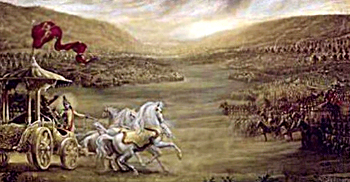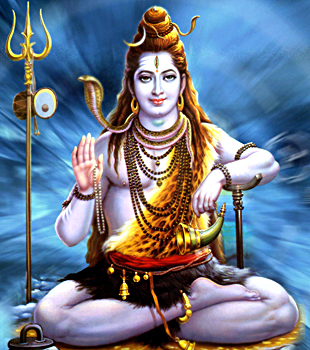 Myth of Goddess Death is a beautiful Brahmanical myth in the Mahabharata which is related twice in the great epic. The story goes that while Yudhisthir was weeping at the loss of several heroes who had fallen in the great battle at Kurukshetra, he started questioning the origin and purpose of death. Vyasa tells him the story which Narada once related to King Anukampaka, when the latter was inconsolable at the death of his son. The contents of the narrative are briefly given below.
Myth of Goddess Death is a beautiful Brahmanical myth in the Mahabharata which is related twice in the great epic. The story goes that while Yudhisthir was weeping at the loss of several heroes who had fallen in the great battle at Kurukshetra, he started questioning the origin and purpose of death. Vyasa tells him the story which Narada once related to King Anukampaka, when the latter was inconsolable at the death of his son. The contents of the narrative are briefly given below.
 When Brahman had created the beings, they multiplied unceasingly and did not die. The worlds became over-filled, and the Earth complained to Brahman that she could no longer bear her burden. Then he considered as to how he could reduce the number of beings, but could think of no remedy. This enraged him, and the fire of his wrath issued from all the pores of his body, flames engulfed the world and threatened to annihilate everything. But Lord Shiva felt pity for the beings and at his intercession Brahman withdrew into himself the fire which had arisen from his wrath, and ordered the origin and passing away of the bangs. While so doing, however, there came forth out of the pores of his body a dark-eyed, beautifully adorned woman, draped in a dark red garment. She wished to go on her way towards the South but Brahman said to her to kill the beings of the world as she had been born out of his thought about world annihilation and therefore she should annihilate the creatures, the fools and the sages, all together.
When Brahman had created the beings, they multiplied unceasingly and did not die. The worlds became over-filled, and the Earth complained to Brahman that she could no longer bear her burden. Then he considered as to how he could reduce the number of beings, but could think of no remedy. This enraged him, and the fire of his wrath issued from all the pores of his body, flames engulfed the world and threatened to annihilate everything. But Lord Shiva felt pity for the beings and at his intercession Brahman withdrew into himself the fire which had arisen from his wrath, and ordered the origin and passing away of the bangs. While so doing, however, there came forth out of the pores of his body a dark-eyed, beautifully adorned woman, draped in a dark red garment. She wished to go on her way towards the South but Brahman said to her to kill the beings of the world as she had been born out of his thought about world annihilation and therefore she should annihilate the creatures, the fools and the sages, all together.
Then the lotus-crowned Goddess Death wept aloud, but the lord of creatures caught up her tears in his hands. She implored him to release her from this gruesome task. She does not wish to kill the innocent people as well as those in the prime of their life, trusted friends, brothers, mothers and fathers as the tears of the unhappy people would burn her for eternity. However, once the Brahman makes a decision it is irrevocable and death would have to submit to it. Yet, he grants her the favour that greed, anger, jealousy, envy, hatred, infatuation and shamelessness may ruin men and that the tears which were shed by the goddess and which he holds in his hand, may become diseases to kill the creatures. Thus no blame for the death of the beings rests upon her. On the contrary, the sinners perish through their own sin. But she, the Goddess Death, free from love and free from hate, is justice itself and mistress of justice, sweeping away the living creatures.
Though a Goddess death plays no part in elsewhere in Indian mythology, she later becomes the Goddess of Justice. The fairly high antiquity of the myth is proven by the exalted position which is allotted to the god Brahman in them. In the myth of the Goddess Death, the god Shiva is subordinate to Brahman, who addresses him as "little son." Myths in which the god Shiva occupies a position far above all gods indicate a much later stratum of Brahmanical poetry in the Mahabharata.



















